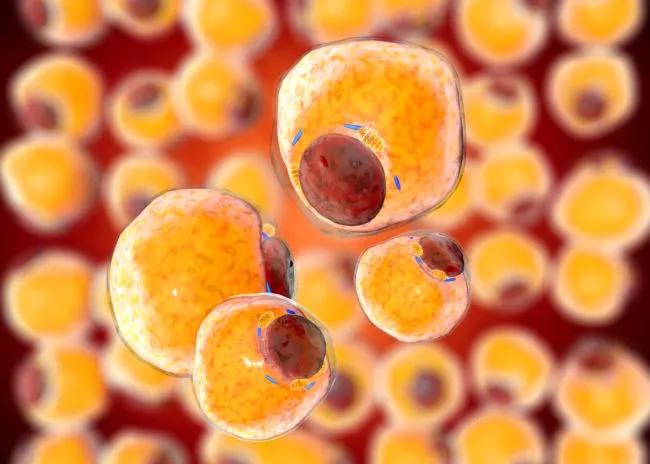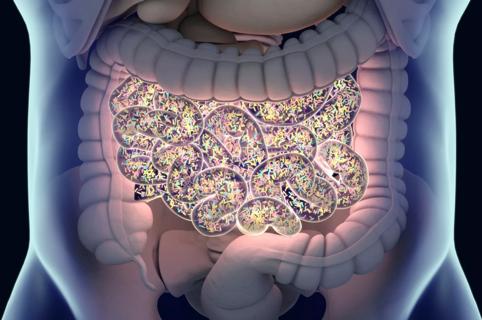Researchers uncover pathway that suppresses fat accumulation

The global diabetes epidemic has led to an urgent clinical need for therapeutic targets to combat obesity. Researchers at Cleveland Clinic Lerner Research Institute have uncovered such a target — a pathway that suppresses fat accumulation.
Advertisement
Cleveland Clinic is a non-profit academic medical center. Advertising on our site helps support our mission. We do not endorse non-Cleveland Clinic products or services. Policy
The team, led by Eugene Podrez, MD, PhD, Department of Molecular Cardiology, studied a protein called Akt, which is known to play an important role in many cellular processes including cellular growth, differentiation, proliferation, apoptosis and metabolism. There are three Akt variations, called isoforms—each with different functions. While the roles of Akt1 and Akt2 in metabolism are well understood, little is known about Akt3. Dr. Podrez’s research suggests for the first time that Akt3 protects against diet-related obesity in a preclinical model by suppressing a mechanism of adipogenesis, or the maturation and accumulation of fat cells.
The researchers observed that when they genetically silenced Akt3 in cell culture, a greater number of preadipocytes differentiated into adipocytes, or mature fat cells. When they overexpressed Akt3, there was fewer adipocytes and, therefore, reduced adipogenesis. Dr. Podrez and his team validated this association, showing that Akt3-deficiency promotes obesity in a preclinical model. Taken together, these results suggest there is a mechanistic link between Akt3 and the maturation and accumulation of fat cells.
The team conducted a series of protein analyses, including silencing and overexpressing a specific set of genes, and discovered they are connected by a complex cascade of cellular events. They found that in the absence of Akt3, the protein kinase WNK1 (WNK lysine deficient protein kinase 1) activates the enzyme SGK1 (serine/threonine-protein kinase Sgk1), which in turn phosphorylates and degrades FOXO1, a transcription factor encoded by the FOXO1 gene. As a result, normally suppressed adipogenic genes, or genes that promote adipogenesis, are expressed. When Akt3 is present, WNK1 expression is inhibited, which prevents the ultimate phosphorylation of FOXO1 and associated adipogenesis.
Advertisement
With a better understanding of the cellular mechanisms that link Akt3 expression and fat accumulation, Dr. Podrez set out to investigate if blocking this pathway can prevent obesity. EMD638683 is a known SGK1 inhibitor. If researchers can prevent SGK1 from “turning on” and phosphorylating FOXO1, they may be able to prevent adipogenesis, independent of whether Akt3 is present or not. To test this hypothesis, they fed young Akt3-negative mice a high-fat diet supplemented with the SGK1-inhibiting drug. White adipose tissue mass and body fat percentage were both significantly lower in those that received the drug compared to those that did not.
These findings suggest that the Akt3/WNK1/SGK1/FOXO1 signaling pathway may play an important role in obesity. More research is needed to explore how drugs and other interventions can inhibit or dysregulate various “check points” in this pathway. This may help to one day prevent or reverse obesity, which is known to play a role in many diseases and conditions.
Liang Ding, MD, PhD, is first author on the study, which was funded by the National Institutes of Health and American Heart Association and published in JCI Insight.
Advertisement
Advertisement

First full characterization of kidney microbiome unlocks potential to prevent kidney stones

Researchers identify potential path to retaining chemo sensitivity

Large-scale joint study links elevated TMAO blood levels and chronic kidney disease risk over time

Investigators are developing a deep learning model to predict health outcomes in ICUs.

Preclinical work promises large-scale data with minimal bias to inform development of clinical tests

Cleveland Clinic researchers pursue answers on basic science and clinical fronts

Study suggests sex-specific pathways show potential for sex-specific therapeutic approaches

Cleveland Clinic launches Quantum Innovation Catalyzer Program to help start-up companies access advanced research technology